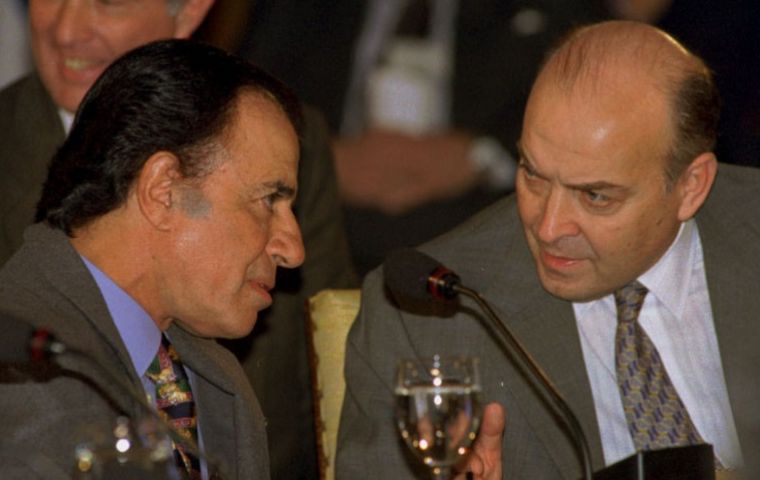MercoPress. South Atlantic News Agency
Court of appeals upholds prison sentences for Menem and Cavallo
 Menem (left) and Cavallo at the peak of their political careers
Menem (left) and Cavallo at the peak of their political careers A Court of Appeals Friday upheld a four-and-a-half-year prison sentence for former Argentine President Carlos Menem for undue bonuses paid to government officials during his administration. His then Economy Minister Domingo Cavallo was sentenced to three and a half years.
In a split decision, Justices Ana María Figueroa and Ángela Ledesma voted in favour of upholding the sentence, while Justice Eduardo Riggi considered that the Supreme Court's jurisprudence regarding a “reasonable time limit” should prevail. It was under that rationale that Menem was pronounced not guilty of aggravated arms smuggling to Croatia and Ecuador last week.
Menem, 88, has parliamentary immunity as a senator but not so Cavallo, 72. However, there is still an extraordinary appeal to the Supreme Court available to both defendants. In any case, if put in custody, both are eligible for house arrest given their ages and health issues. In Menem's case, the Senate should first lift his privileges.
There are other cases for which both Cavallo and Menem are on trial for unclear deals between 1989 and 1999 when the latter was president.
Friday's ruling also acquitted Menem's Justice Minister Raúl Granillo Ocampo, who had been sentenced to three years in prison by the lower court.
The bonuses case was a spinoff from the trial for illicit enrichment of Menem's key minister María Julia Alsogaray, who was found guilty and convicted. She had explained her unexplainable economic growth because of the “envelopes” that were reportedly paid to the ministers and to Cavallo himself. Alsogaray died on September 24, 2017.
During the oral trial against Menem, Cavallo and Granillo Ocampo, which ended in 2015, a “clandestine payment system” with money from reserved funds, withdrawn from the General Secretariat of the Presidency until 1994 and after that from the Cabinet Office or the fifth floor of the Ministry of Economy was deemed proven.
According to this mechanism, the ministers considered of higher rank received bonuses of 100 thousand pesos (worth as many US dollars during the convertibility era) and the remaining members of the cabinet collected between 50 and 20 thousand pesos or dollars always in cash and inside an envelope, which four or up to five times their legal monthly salaries.
”I never knew that the supplements could come from an illegal act, if I knew it, I would not have declared it in the DGI (tax bureau),” Cavallo had said in his defence.




Top Comments
Disclaimer & comment rulesCommenting for this story is now closed.
If you have a Facebook account, become a fan and comment on our Facebook Page!